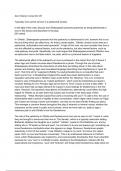Act 2 Scene 3 Lines 94-127
‘Typically, love cannot survive in a patriarchal society.’
In the light of this view, discuss how Shakespeare presents patriarchy as being detrimental to
love in this extract and elsewhere in the play.
[25 marks]
In ‘Othello’, Shakespeare presents how the patriarchy is detrimental to love, however this is not
the only thing which can affect love. As Anita Loomba states, “Othello, should not be read as a
patriarchal, authoritative and racist spectacle”. In light of this view, we must consider how love is
not only affected by external factors, such as the patriarchy, but also internal factors, such as
male jealousy and pride. Specifically, one could argue that Shakespeare presents Othello’s love
as destructive due to his fated hubris, his pride, which is a profound feature of tragedies.
The detrimental effect of the patriarchy on love is portrayed in the extract from Act 2 Scene 3
when Iago and Cassio converse about Desdemona in prose. Through the use of prose,
Shakespeare diminishes the importance of what they are talking about; in this case about
women and drinking. Iago uses sexualised language describing how Desdemona is “sport for
Jove'', that hints at her ‘supposed infidelity’ by saying Desdemona is so beautiful that even
God's lust for her. In Elizabethan England this would have been detrimental to a man’s
reputation and pride and in Othello’s case would further his ‘Othering’. This is in contrast to
Cassio’s view of Desdemona as “indeed perfection”, which could be interpreted as Cassio’s
romantic feelings for her. Perhaps Iago did not have to ‘force’ Cassio to have a false affair - it
may have been fate (a tragic element) for Cassio to have feelings for Desdemona in the first
place. However, his hyperbolic descriptions of Desdemona, alternatively could reflect his high
regard for Othello as we later learn that Cassio was involved in the early days of their
relationship - “What, Michael Cassio/That came a-woowing with you?” To add to this, the use of
stichomythia adds a sense of rapidity to their conversation, which might make it seem as if Iago
and Cassio are having a secret conversation, one they do not want Othello finding out about.
This emerges a common theme throughout the play of external vs internal voices; whether the
characters act the same in public and in private, which we know later on, adds to Iago’s
malicious plan to end Othello’s love for Desdemona.
The role of the patriarchy in Othello and Desdemona’s love can be seen in Act 1 scene 3, when
they are brought to announce their love in ‘The Senate’; which is a typically masculine setting.
Brabantio idealises his daughter as a ‘perfect’ “maiden”, typical in the Elizabthen era, and by
stating she is “Of spirits so still and quiet”, he connotes to a pure and passive girl; something we
know Desdemona contradicts when she appears on stage. Moreover, Desdemona speaks
assertively in front of the senate; “I saw Othello’s visage in my mind / to honour his valiant
parts/. Did I my soul and fortunes consecrate”. This is an intertextual reference to Cinthio’s
novel, which Shakespeare was inspired by, and could possibly foreshadow their love’s downfall
because her very “soul” is in Othello’s hands. Alluding to the Elizabethans’ interest with the
supernatural and mysterious, “soul” and “fortunes” are things which Desdemona really does not




